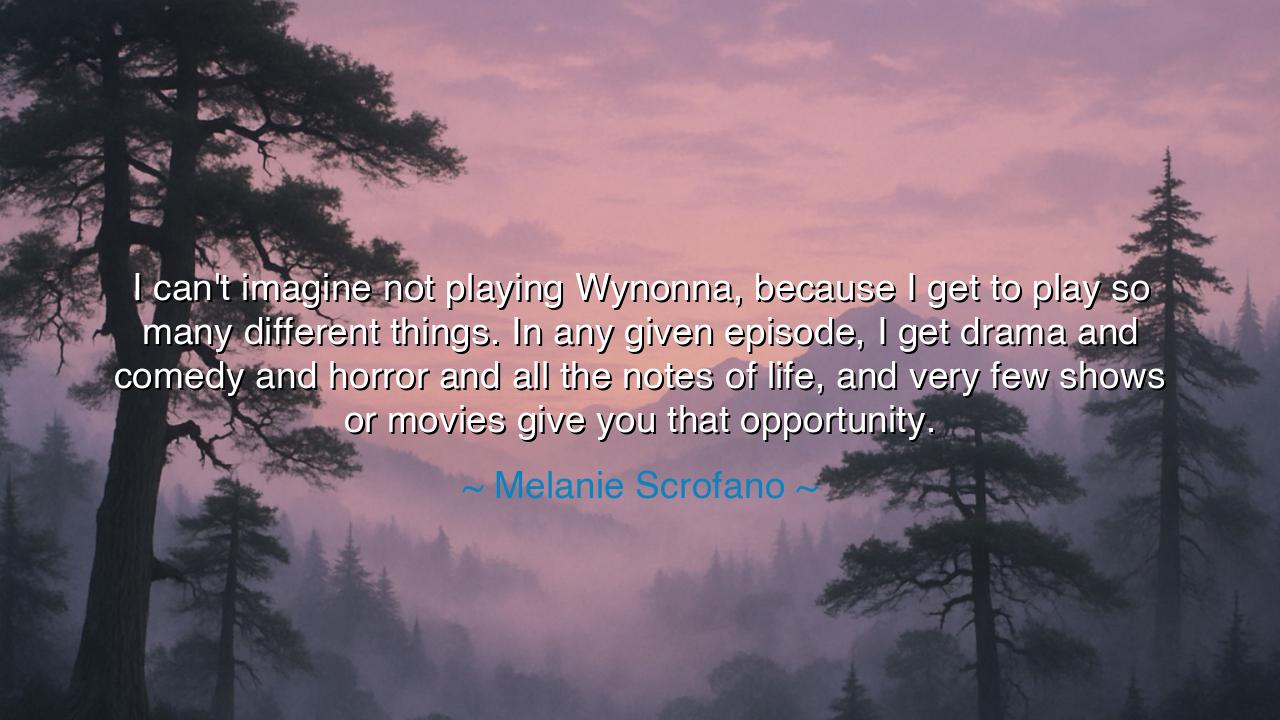
I can't imagine not playing Wynonna, because I get to play so
I can't imagine not playing Wynonna, because I get to play so many different things. In any given episode, I get drama and comedy and horror and all the notes of life, and very few shows or movies give you that opportunity.






Ah, the words of Melanie Scrofano, who, through her portrayal of Wynonna, reveals the profound beauty of versatility in art: "I can't imagine not playing Wynonna, because I get to play so many different things. In any given episode, I get drama and comedy and horror and all the notes of life, and very few shows or movies give you that opportunity." In these words, Scrofano reflects not only on the richness of her role but on the deep truth that life itself is a tapestry woven with all manner of experiences—drama, comedy, horror, and everything in between. Just as the ancient heroes of myth encountered trials of every kind, so too does Wynonna, a character who embodies the complexity of the human condition through every facet of her story. Scrofano's journey in playing this character is a reminder that the fullness of life can only be expressed when we allow ourselves to experience all its contradictions, all its layers.
In the ancient world, the great tragedians and playwrights knew well the complexity of life and the need to weave together both sorrow and joy to tell a complete story. Sophocles, in his masterpiece "Oedipus Rex," did not present a single, simple emotion but combined the sublime and the terrible, showing the complexity of fate and the human spirit. Similarly, Shakespeare, the immortal bard, mastered the interplay between comedy and tragedy, understanding that the full range of human experience is what makes life meaningful. Scrofano, like these ancient storytellers, inhabits a role that allows her to explore the full spectrum of human emotion, from the light-hearted to the dark and tragic, embodying a character who is, in a sense, a living epic.
What Scrofano speaks to is the rare gift of being able to experience multiple dimensions of the self through a single character. Wynonna, as a character in a world filled with supernatural threats and family turmoil, is a reflection of the many roles we all must play in life. At times, we are called to act with courage and strength, at other times with humor and lightness, and still at other times with anguish and vulnerability. This multifaceted nature of the character speaks to a universal truth: life is rarely one-dimensional. We are all called to embrace the complexity of our own existence and to live it with the understanding that every moment brings a new layer of experience.
Consider the ancient figure of Heracles, the hero who faced a series of trials that included tasks of both immense physical challenge and emotional depth. His journey was not simply about fighting monsters; it was about endurance, loss, and the inner transformation he underwent. In many ways, Heracles’s journey mirrors that of Wynonna, who faces external battles with demons, but also internal battles with herself and her family. Her strength lies not just in her ability to fight, but in her capacity to navigate the many sides of her identity—her fear, humor, love, and rage—in a way that feels both real and heroic.
Scrofano’s role, then, is a testament to the power of diversity in storytelling—the understanding that to truly capture the human experience, we must allow space for all the emotions and contradictions that life offers. Just as Homer’s heroes were complex and multi-dimensional, so too must the characters of today embody the full scope of what it means to be alive—to experience the ecstasy of love and the depths of despair in equal measure. The modern storyteller, whether on screen or stage, must recognize that characters—like Wynonna—are most compelling when they live not in extremes but in the gray areas, where life’s drama unfolds in the delicate balance between light and dark.
The lesson we draw from Scrofano’s words is one of embracing the full range of experience in our own lives. Too often, we limit ourselves by believing that we must be one thing—that we are defined by a single emotion or role. But like the characters of ancient epics and modern stories, we must allow ourselves to be multifaceted, to experience and express both the joys and sorrows of life with equal depth. In doing so, we live more fully, more authentically, and more in tune with the reality of what it means to be human.
Thus, the call to action is clear: embrace the complexity of your own journey. Recognize that life is not simply one role, one emotion, or one experience, but a rich tapestry of many. Like Scrofano, who inhabits a character that embraces both drama and comedy, tragedy and hope, we too must allow ourselves to live in the fullness of our humanity. Allow yourself to laugh, to cry, to fight, and to love—for in this embrace of life’s many notes, we find the richness and depth that make us whole. Just as the great heroes of myth navigated their worlds with both strength and vulnerability, so must we walk the path of our own existence, embracing all that it offers.






AAdministratorAdministrator
Welcome, honored guests. Please leave a comment, we will respond soon